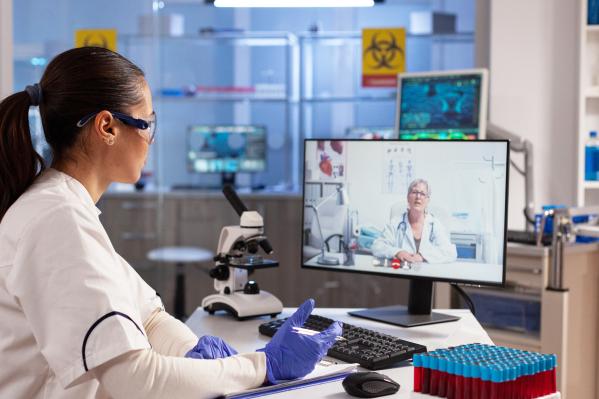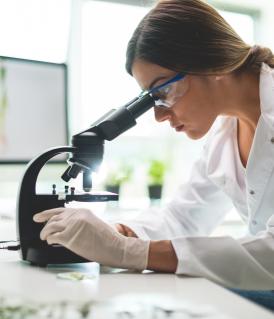Making a difference through science diplomacy

Academic mobility and academic partnerships are becoming ever more important, including as part of a sustainable German foreign policy. German science diplomacy is an active force in shaping these networks and campaigns for the freedom of academia and research around the world. Ultimately, the only way to overcome global challenges such as peace, climate change and pandemics is by working together with international partners.
How international Germany is as a centre for science
In the 2023/24 winter semester, 379,939 international students were enrolled at universities in Germany - that’s 13 percent of all students in Germany.
The most popular host countries are Austria, the Netherlands, Switzerland, the United Kingdom and the USA.
Roughly 65,500 academics and artists of non-German citizenship were employed at universities in Germany in 2023.
How does Germany support young talents worldwide?
Scholarship programmes form a key plank of German science and higher education policy. Such scholarships provide funding for foreign students and researchers to visit Germany. For example, the German Academic Exchange Service ( DAAD DAAD The German Academic Exchange Service (DAAD) is an organization run jointly by the German institutes of higher education. Its purpose is to promote relations between higher education institutes in Germany and abroad, especially through exchange schemes between students and academics. As a rule its… Read more › ) and Alexander von Humboldt Foundation Humboldt Foundation The Alexander von Humboldt Foundation was founded in 1860 and today promotes academic collaboration between excellent foreign and German researchers. Every year it enables 2,000 international researchers to spend time working in Germany and maintains a worldwide network of some 30,000 Humboldtians… Read more › award scholarships and fund academic programmes. In this context they work closely together with German diplomatic missions and develop funding projects such as the “Leadership for Africa” scholarship programme, which enables talented young students from countries that take in high numbers of refugees to do a master’s degree course in Germany.
Dual degree programmes and binational universities
Besides such scholarship programmes, Germany also funds higher education partnerships around the world. The Higher Education Compass lists around 37,000 cooperative projects with over 5,400 partner universities in more than 150 countries. Such cooperation agreements have also led to dual degree courses and binational universities abroad, e.g.
- the Kazakh-German University in Almaty,
- the German University in Cairo or
- the Turkish-German University in Istanbul.
Beacons of German academic cooperation with partner countries include the DAAD DAAD The German Academic Exchange Service (DAAD) is an organization run jointly by the German institutes of higher education. Its purpose is to promote relations between higher education institutes in Germany and abroad, especially through exchange schemes between students and academics. As a rule its… Read more › ’s Global Centres for Climate and Environment and Centres of Excellence, and the Humboldt Research Hubs in Africa. These centres serve as platforms for academics from Germany and other countries to share ideas and collaborate on global challenges, with a particular focus on working with academics from the Global South.
How does Germany promote academic freedom?
Academic protection programmes are a major priority for German science diplomacy. One example is the Philipp Schwartz Initiative, which has been administered by the Humboldt Foundation Humboldt Foundation The Alexander von Humboldt Foundation was founded in 1860 and today promotes academic collaboration between excellent foreign and German researchers. Every year it enables 2,000 international researchers to spend time working in Germany and maintains a worldwide network of some 30,000 Humboldtians… Read more › since 2015. It is a special programme to help at-risk academics and researchers to assimilate and integrate in Germany. The Federal Government Federal Government The Federal Government and cabinet is made up of the Federal Chancellor and the Federal Ministers. While the Chancellor holds the power to issue directives, the ministers have departmental powers, meaning that they independently run their respective ministries in the framework of those directives… Read more › also acknowledges its key responsibility to give young people living through crises and in conflict zones the prospect of gaining academic and scientific training. Germany provides support and services to refugees around the world. This eases the burden on those countries that are the first port of call for refugees, while also giving refugees the prospect of finding employment and reducing secondary migration. For more than 30 years the Albert Einstein German Academic Refugee Initiative (DAFI), which is funded by the Federal Foreign Office, has worked with the UNHCR to help refugees access higher education in their countries of first arrival.
Germany – research and innovation hub
Germany is a high-tech nation, so promoting international partnerships is an essential element of all strategic future planning. As a “shop window” and long-term presence for German academic and scientific organisations, the German Centres for Research and Innovation (DWIH) work in cities such as
- New Delhi,
- New York,
- Tokyo,
- São Paulo and
- San Francisco
to promote and network on behalf of Germany as a nation of innovation.


